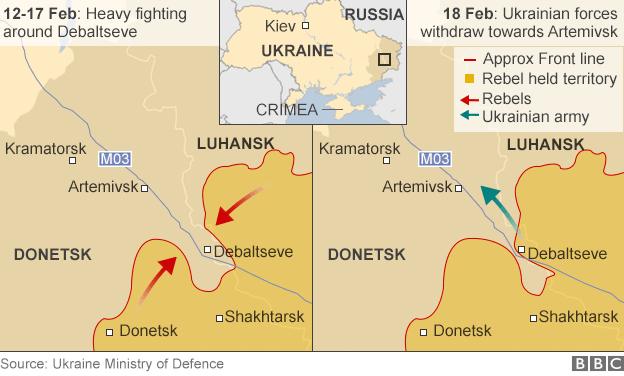Ukraine accuses Russia over Maidan 2014 killings
- Published
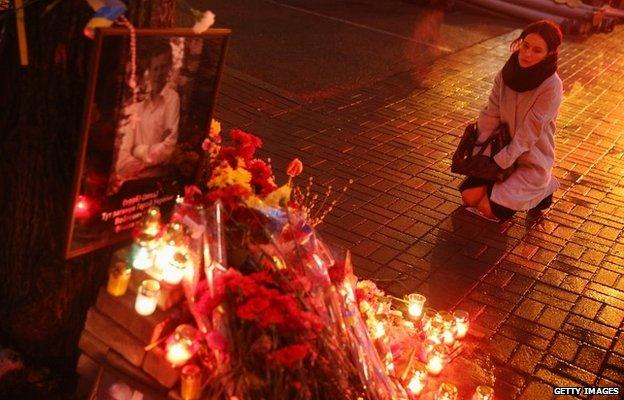
The streets of central Kiev were candlelit for the Maidan memorial ceremony
Ukrainian President Petro Poroshenko has accused Russia of direct involvement in the sniper fire which killed dozens of protesters in central Kiev a year ago.
He was speaking as the capital marked the first anniversary of the clashes between protesters and police which toppled ex-President Viktor Yanukovych.
A top Kremlin aide, Vladislav Surkov, had organised snipers, he alleged.
The Russian government hit back at the claim, calling it "nonsense".
More than 100 people died in the violence on Kiev's central Independence Square, known as the Maidan, a year ago.
The anti-Yanukovych revolt was called the "EuroMaidan revolution", as huge crowds demanded a pact with the EU.
In a speech at the Maidan on Friday, President Poroshenko condemned the insurgency by pro-Russian rebels in the east.
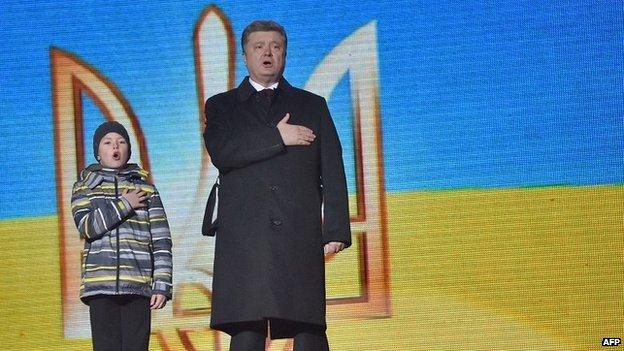
President Poroshenko sang the national anthem with the son of an activist who died last year
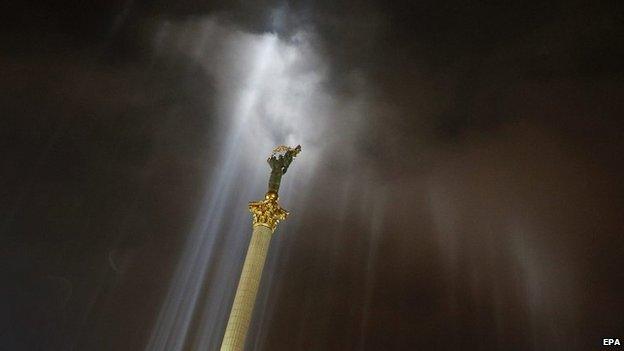
Lights shone where the activists were killed in Independence Square
Earlier, he told Maidan victims' relatives that, according to Ukrainian state security, "the Russian presidential aide Vladislav Surkov led the organisation of groups of foreign snipers on the Maidan".
The claim was first made by the head of Ukraine's security services on Thursday.
Mr Poroshenko was speaking just two days after his army retreated from the key town of Debaltseve, now in rebel hands.
Rebel advance
Ukraine, Western leaders and Nato say there is clear evidence Russia is helping the rebels with heavy weapons and soldiers. Moscow denies this, insisting that any Russians serving with the rebels are "volunteers".
Ukrainian military spokesman, Andriy Lysenko, said more than 20 Russian tanks, 10 missile systems and busloads of troops had entered Ukraine in the past 24 hours, heading for Novoazovsk, a rebel-held town on the coast. The report has not been confirmed.
The Maidan ceremony included poetry, a choir singing the national anthem, and a performance of Mozart's Requiem by the National Symphony Orchestra of Ukraine.
What happened in the Maidan? A look back to the events of 20 February 2014, one the bloodiest day of Ukraine's civil unrest
Mr Yanukovych - a political ally of Moscow - fled into exile in late February 2014, but soon resurfaced in the southern Russian city of Rostov-on-Don.
He said he had been ousted in an "illegal coup" and lambasted the "fascists" who had taken power in Kiev.
For weeks in the winter of 2013-2014 the Maidan was a vast campsite populated by EuroMaidan protesters, who kept police at bay with barricades and burning tyres.
Most of those killed in the clashes were shot by snipers, and some uniformed police were filmed firing at protesters.

At the scene: Anastasiya Gribanova, BBC News, Kiev
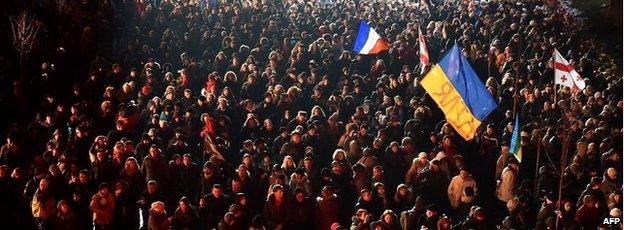
Maidan was a breathtaking scene on Friday night - lit by thousands of candles and covered flowers to honour those who died here last winter.
The crowd chanted "Glory to Ukraine!" and "Glory to heroes!" before falling silent as the orchestra played Mozart's Requiem and projectors rose into the sky from the spots where each protester was killed.
Emotions were high. Many people we talked to couldn't contain their tears as they laid carnations and tulips on makeshift shrines.
"We will never forget these people," said Olena from Kiev. "We will come here every year."
"This is not a celebration. This is a day to remember," said Igor, who was wounded at Maidan last year.

Mr Poroshenko said on Friday that phone records obtained by Ukrainian state security showed a direct Russian state role in the shootings. Those records, he said, revealed "conversations between Yanukovych and Russian state security officials.
"They prepared for the shooting together, in advance."
Russia's foreign ministry spokesman, Alexander Lukashevich, said Mr Poroshenko had been duped by his security aides.
"Ukraine's investigative and security services have things to be getting on with. But at the moment, instead of carrying out investigations, they're exploiting people's deaths and putting out nonsense worthy only of a mental hospital," he said.
Battlefield
Shelling continues to mar a ceasefire for eastern Ukraine signed in Minsk on 12 February.
An intense rebel bombardment forced some 2,500 government troops to retreat from Debaltseve on Wednesday, and dozens of others surrendered.
The village of Chernukhino, near Debaltseve, is now in rebel hands too, according to the Kiev-appointed governor of Luhansk region, Gennadiy Moskal.
US Vice President Joe Biden condemned the rebel offensive on Debaltseve in a phone call with Mr Poroshenko on Friday.
The White House said he also discussed options for "effective monitoring" of the ceasefire and the withdrawal of heavy weapons.
On Wednesday, President Poroshenko called for UN peacekeepers to be deployed to eastern Ukraine to enforce the ceasefire.

At the scene: Paul Adams, BBC News, Debaltseve
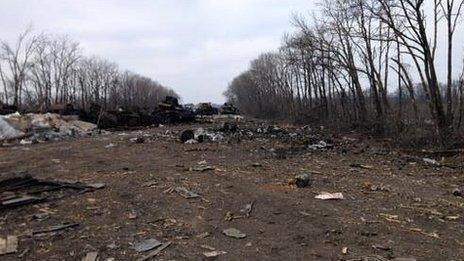
The streets of Debaltseve were mostly quiet and mostly deserted as we entered the city for the first time since intense fighting ended.
Those civilians still holed up in the city, who have been without water, gas and electricity since early January, were slowly emerging from shelters to see what was left of their homes.
But there were more rebels than civilians, with convoys of victorious separatists returning from the recent clashes.
Evidence of the fighting was littered across the roads and we spotted the bodies of two Ukrainian solders that had been lying in the cold for three days.
